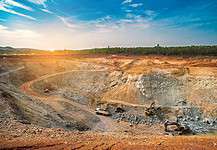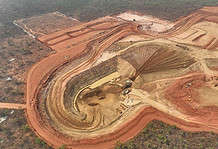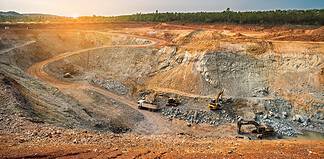Image: the city of Dubbo.
BY ELIZABETH FABRI
AT the geographic heart of NSW lies the regional centre of Dubbo – the largest city in the Orana region with an impressive and growing economic profile. A new wave of mining projects is set to give the town a boost, with added jobs and flow-on benefits to local business.
Dubbo businesses already supply goods and services to a number of mining operations around the region and the promise of new mines is set to increase opportunities.
Dubbo mayor Ben Shields said mining was a growth industry in the region, with businesses expanding and taking advantage of the city’s strategic location and junction for road, rail and air freight services.
“From heavy vehicle supplies and services, to civil construction consultancies and mining engineering specialist services to logistics and transport, Dubbo is integrally linked in the mining supply chain,” Mr Shields told The Australian Mining Review.
“Dubbo has benefited from the development of new mines in neighbouring council areas and as actual mining production commences in the Dubbo local government area (LGA) there is further opportunity for local employment and the spin-offs this has in terms of new jobs in retail, housing and construction to service employees in the mining industry.
“The ability of Dubbo to grow its capacity as a service centre to play a more significant role in the Mining Equipment and Technology Services is significant, with available zoned land, strategic plans in place and businesses on the cusp of this type of development.”
Projects underway included Alkane Resources’ Dubbo project and Tomingley expansion, as well as Clean TeQ’s Sunrise project.
The Tomingley mine, near Dubbo. Image: Alkane Resources.
Developments
Alkane Resources’ construction-ready Dubbo rare earths project was now in the financing and offtake stage, and its established Tomingley Gold Operations (TGO) will also soon transition from open cut to underground mining.
In late September, the miner gave the Tomingley underground development the thumbs up, with ground support work for the portal to begin by the end of the year.
Tomingley, just 50km south-west of Dubbo, has been providing a steady flow of jobs for the region since it was opened in February 2014.
Alkane Resources managing director Nic Earner said the commitment to go underground at Tomingley meant Alkane would continue to operate for at least an additional 40 months over the life of the open cut operations, and result in recruitment of about 30 underground miners.
First ore from the underground mine was expected in mid-2019, which will result in an estimate 93,000 ounces of gold production.
Mr Earner said the underground resource was open along strike and at depth, which meant they were hoping to drive wide and deeper than currently planned.
“We’ll do this exploration for extensions from underground,” he said.
“We continue to explore for gold in the region and would like to see ongoing production from around Tomingley, Peak Hill and other locations.”
However, it was the undeveloped Dubbo project that presented a longer-term growth option for the region.
The deposit, comprising a large in-ground resource of zirconium, hafnium, niobium and other elements, was set to supply the emerging battery metals market.
With an 18.90mt ore reserve and 75.18mt resource, the project had an estimated 20-year mine life, 1mtpa plant feed rate, and significant extension and expansion potential.
The project had all major environmental approvals in place, and Alkane was continuing to progress discussions with customers and investors.
“Once we have financing in place we can begin,” Mr Earner said.
He said there was excitement building in the region for the long-term careers and opportunities the project would bring.
“We buy and use local when possible which has helped many local businesses grow,” he said.
“Dubbo has a large skilled workforce so we aim to employ mostly from the local area.
“We only have limited and specialised skills that travel in and out of Dubbo to work.
“The products from the Dubbo project are used in a lot of downstream manufacturing, we hope that other businesses will be attracted to the region for that purpose.”
The next cab off the rank was Clean Teq’s Sunrise cobalt and nickel mine, 160km from Dubbo – which was scheduled to begin construction next year with first production in 2021.
According to Clean TeQ, the project was “one of the highest grade and largest nickel and cobalt deposits outside of Africa and and one of the largest and highest grade scandium deposits in the world”.
In June, Clean TeQ completed a Definitive Feasibility Study, which demonstrated the project’s global importance.
The DFS modelled the first 25 years of production, with sufficient ore reserves to extend beyond 40 years.
The company also said it planned for a peak construction workforce of 1000 people, and an operations workforce of about 300 people, which would generate strong employment opportunities in NSW.
In August, the project moved another step forward after Clean TeQ entered a heads of agreement with Metallurgical Corporation of China (MCC) to be a key project delivery partner.
Clean TeQ said the delivery of the EPC contract would reduce financial and project execution risk, and front-end engineering and design (FEED) was planned to begin later this calendar year.
“With MCC now engaged, Clean TeQ can continue to progress the build-up of our delivery team in preparation for the construction expected to commence in mid-2019,” Clean TeQ chief executive Sam Riggall said.
“During operations, the majority of workers are expected to reside in local communities.
“As well as the considerable financial benefits from royalties and taxed paid by the project, there will be a strong community dividend in the form of employment opportunities, community enhancement contributions and infrastructure upgrades.
“When it comes to community investment and development, our approach seeks to recognise the importance of consulting the community about how it wants to grow and thrive.”
The Dubbo community was also set to benefit from a pending decision to declare Dubbo a “fossicking district”.
The Dubbo Regional Council was understood to be considering gazetting its local government area as a fossicking region; the small-scale search for mineral and gemstones in land holder approved areas.
Historically, gold, agate, common opal, chalcedony and fossils have been found in Dubbo.









































